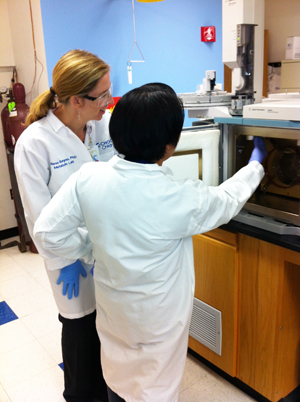 Clinical biochemical training takes place at our affiliate site, Children’s Hospital of Orange County under the direction of Jose Abdenur, MD.
Clinical biochemical training takes place at our affiliate site, Children’s Hospital of Orange County under the direction of Jose Abdenur, MD.
A clinical biochemical geneticist is an individual with a U.S. earned doctoral degree (MD, DO PhD, or the equivalent) who can correctly perform and interpret biochemical analyses relevant to the diagnosis and management of human genetic diseases, and who acts as a consultant regarding laboratory diagnosis of a broad range of biochemical genetic disorders.
The UCLA Intercampus Medical Genetics Training Program Clinical Biochemical Geneticist will be trained to manage a laboratory for the diagnosis and monitoring of patients with this family of conditions. Instruction is provided in all aspects of the discipline. This includes laboratory diagnostic methods, interpretation and pitfalls and result reporting. The trainee will focus on laboratory procedures, operation, maintenance and trouble-shooting, evaluating new and alternative procedures. Trainees will be taught that in a field known to few non-specialists, each will have unusual responsibilities for interpretation of results.
These American Board of Medical Genetics and Genomics requirements imply that the individual possess:
- the ability to supervise and direct the operations of a clinical biochemical genetic diagnostic laboratory, including technical expertise and knowledge in quality control and quality assurance procedures;
- Broad knowledge of (1) basic biochemistry and genetics, (2) the application of biochemical techniques to the diagnosis and management of genetic diseases, and (3) the etiology, pathogenesis, clinical manifestations, and management of human inherited biochemical disorders;
- an understanding of the heterogeneity, variability, and natural history of biochemical genetics disorders
- Diagnostic and interpretive skills in a wide range of biochemical genetic problems; and
- the ability to communicate biochemical laboratory results in the capacity of a consultant to medical genetics professionals, to other clinicians, and directly to patients in concert with professional staff.
Trainees spend a variable amount of time doing clinical work to meet Board requirements. Trainees also spend a required two-week rotation in each of the labs outside their own specialty. Fellows are expected to attend all related seminars and lectures at their base hospital. The mix of laboratory work, clinical cases, conferences, and lectures is intended to provide comprehensive training in all aspects of medical genetics.
THE APPLICATION PROCESS
Applications are accepted from January 1 through August 31 of the year PRIOR to entering training. For example, applications received from January 1 through August 31, 2015, will be for a start date of July 1, 2016.
Selection of candidates to invite for interviews will be made by the Training Directors and Associate Directors in each respective Laboratory category.
Interviews with individual faculty members within the specialty applied for will be arranged during the months of September and October. Selection of the new fellow(s) will be decided by the end of November. Selected candidates will be notified in December.
TO BE CONSIDERED FOR AN INTERVIEW
You must have a COMPLETED application on file that is composed of the items listed below:
USA/Canadian Trained PhD's seeking Genetics Fellowship in any of the Laboratory Specialties:
- Application form
- Three (3) letters of recommendation. One of these letters must be from your current supervisor, thesis advisor or department/division director.
- Copy of your CV
INFORMATION FOR ALL FOREIGN GRADUATES
Please note: We cannot support RESEARCH visas in the clinical laboratory specialties
Non-USA/Canadian PhD's seeking Board Certification in any of the Clinical Laboratory Specialties:
- Application form
- Three (3) letters of recommendation. One of these letters must be from your current supervisor, thesis advisor or department/division director.
- Copy of your CV
- A Credentials Review by the American Board of Medical Genetics and Genomics.
Non-USA/Canadian PhD's NOT seeking Board Certification in any of the Clinical Laboratory Specialties:
- Application form
- Three (3) letters of recommendation. One of these letters must be from your current supervisor, thesis advisor or department/division director.
- Copy of your CV
